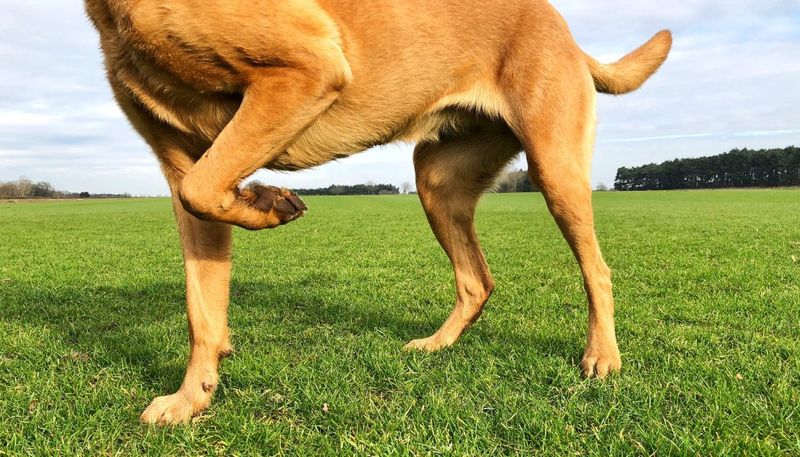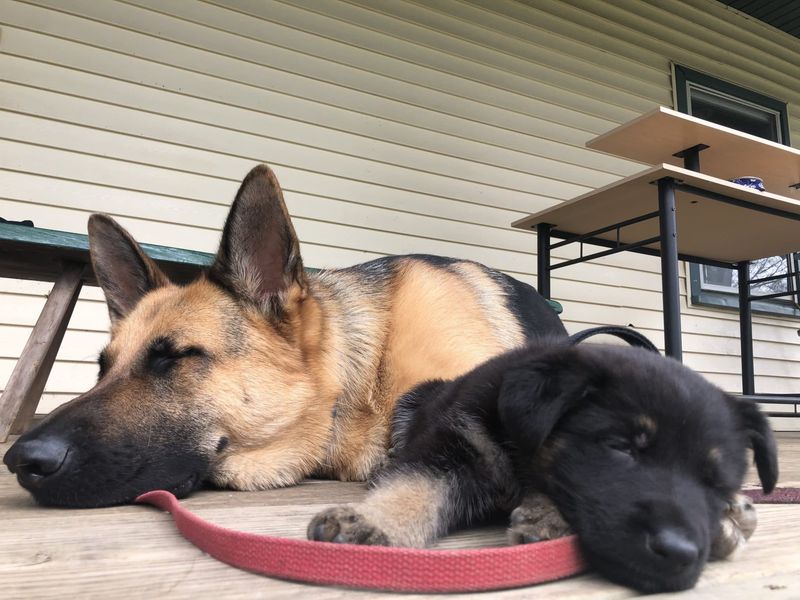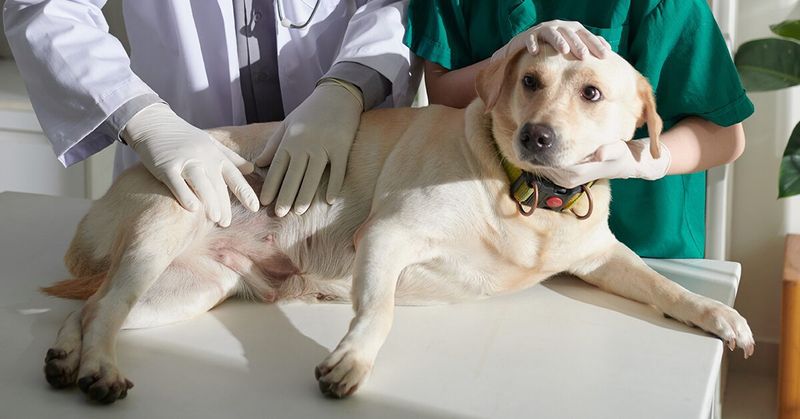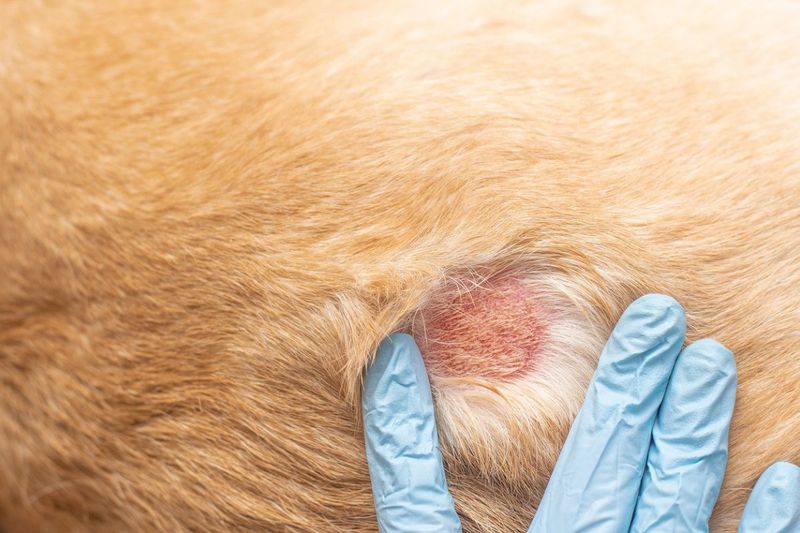Just like humans, dogs can experience discomfort and illness. However, our furry friends can’t tell us when something is wrong, so it’s up to us to recognize the signs. Here are 13 warning signs that your dog might be in pain or feeling sick, and what you can do to help.
Limping or Lameness
Limping is often the first sign that something might be wrong with your dog’s mobility. Perhaps you notice your pet favoring one leg over the other or struggling to climb the stairs. This could be a result of an injury, arthritis, or even a minor sprain. It’s essential to observe if the limping persists over a few days.
If the condition worsens or doesn’t improve, a visit to the vet is crucial. Sometimes, rest and recovery are all that’s needed, but don’t take chances. Keep an eye out for additional symptoms like swelling or heat in the limb.
Excessive Panting
Panting is normal for dogs, especially after exercise or during hot weather. However, excessive panting can indicate stress, pain, or underlying health issues. If your dog starts panting heavily without a clear reason, it could be time to investigate.
Make sure your dog is hydrated and has a cool place to rest. If the panting is accompanied by other symptoms like lethargy or vomiting, consult your veterinarian. Sometimes, a simple environmental change can help, but persistent issues warrant professional attention.
Loss of Appetite
Every dog loves a good meal, so when your furry friend shows disinterest in food, it’s a red flag. A loss of appetite can signal various issues, from dental problems to more severe conditions like infections or organ dysfunction.
Monitor your dog’s eating habits over a couple of days. If there’s no improvement, it’s wise to consult a veterinarian. Sometimes, stress or a change in environment can affect their appetite, but prolonged disinterest requires investigation. Remember, a healthy diet is vital for your dog’s wellbeing.
Excessive Sleeping
While dogs do love their naps, excessive sleeping can suggest health problems. Older dogs especially might sleep more, but if your dog seems constantly tired or less playful, there could be an underlying issue.
Consider their age, breed, and lifestyle in determining if their sleep patterns are normal. If changes in sleep habits are sudden or accompanied by other symptoms like weight loss or disorientation, a vet visit is advisable. Sometimes, a comfortable resting environment can help, but persistent fatigue shouldn’t be ignored.
Frequent Vomiting
Occasional vomiting isn’t unusual for dogs, but frequent vomiting can be a sign of something more serious. Your dog may have eaten something it shouldn’t have, or it could be suffering from a gastrointestinal issue.
If vomiting persists, observe the frequency and any accompanying symptoms like diarrhea or lethargy. A clear pattern of illness necessitates a trip to the vet. Ensure your dog stays hydrated and limit food intake until you understand the cause. Vomiting can quickly lead to dehydration, so don’t delay seeking help.
Persistent Coughing
Coughing can be caused by various factors, from something as simple as an irritant in the throat to more serious conditions like kennel cough or heart disease. If your dog’s coughing persists for more than a week, it’s time to consider a vet visit.
Observe if the cough worsens at night or after physical activity. Changes in cough patterns, such as coughing up mucus, are also concerning. Sometimes, a mild cough can resolve on its own, but prolonged coughing shouldn’t be ignored.
Changes in Bathroom Habits
Bathroom habits can tell a lot about your dog’s health. Sudden changes like diarrhea, constipation, or frequent urination can indicate dietary issues or more serious conditions such as infections or bladder problems.
Keep track of any changes and their duration. If these issues persist or are accompanied by other symptoms, consult your veterinarian. A balanced diet and regular hydration can often alleviate minor problems, but persistent issues could require medical intervention.
Swelling or Bloating
Swelling, particularly in the abdominal area, can be alarming. It might be due to simple gas or something more severe like bloat, which is life-threatening and requires immediate attention.
Monitor your dog’s behavior for signs of discomfort or pain. If swelling appears suddenly, it’s crucial to seek veterinary assistance. Bloat is especially dangerous, causing the stomach to expand and twist, leading to severe complications. Always err on the side of caution when it comes to swelling.
Unusual Aggression or Anxiety
Dogs can exhibit changes in behavior when they aren’t feeling well. Sudden aggression or anxiety might indicate pain or discomfort. Perhaps your usually calm pet starts growling or becomes overly clingy.
Pay attention to any triggers that might cause this behavior. Sometimes, environmental changes or stressors are to blame, but if the behavior persists, a vet check is essential. Understanding the root cause can help in addressing the problem effectively. Behavioral changes are often a key indicator of underlying health issues.
Changes in Coat or Skin
A dog’s coat and skin are good indicators of health. Noticeable changes like dryness, flakiness, or excessive shedding can signal nutritional deficiencies or allergies. If your dog’s coat loses its shine or you find patches of irritated skin, pay attention.
Regular grooming and a balanced diet typically support healthy skin and coat, but persistent issues should be evaluated by a vet. Sometimes, seasonal changes can affect a dog’s coat, but ongoing problems can indicate more severe health concerns.
Difficulty Breathing
Breathing problems are a serious concern for any dog owner. If you notice your dog wheezing, struggling to breathe, or showing signs of distress, it’s crucial to act quickly.
These symptoms can be caused by allergies, infections, or more severe respiratory issues. Ensure your dog is comfortable and avoid stress-inducing environments. A prompt visit to the vet can help diagnose the problem and provide relief.
Difficulty breathing should never be ignored, as it can lead to life-threatening complications.
Excessive Itching or Scratching
Itching is common, but excessive scratching can be a sign of skin problems, parasites, or allergies. If your dog seems unable to stop scratching, it may need help.
Check for fleas, ticks, or any skin irritations that might be causing discomfort. If the scratching persists despite treatment, consulting a vet for further investigation is wise. Proper grooming and regular checks can prevent many skin issues, but persistent itching requires professional assessment.
Unexplained Weight Loss
Unexpected weight loss can be concerning, indicating underlying health problems. If your dog begins losing weight without any changes in diet or activity, it’s important to take note.
Monitor their eating habits and activity levels. Weight loss can be attributed to conditions like metabolic disorders, infections, or dental problems. Consult your veterinarian to determine the cause and appropriate action. Maintaining a balanced diet and monitoring weight can help in early detection of potential issues.













